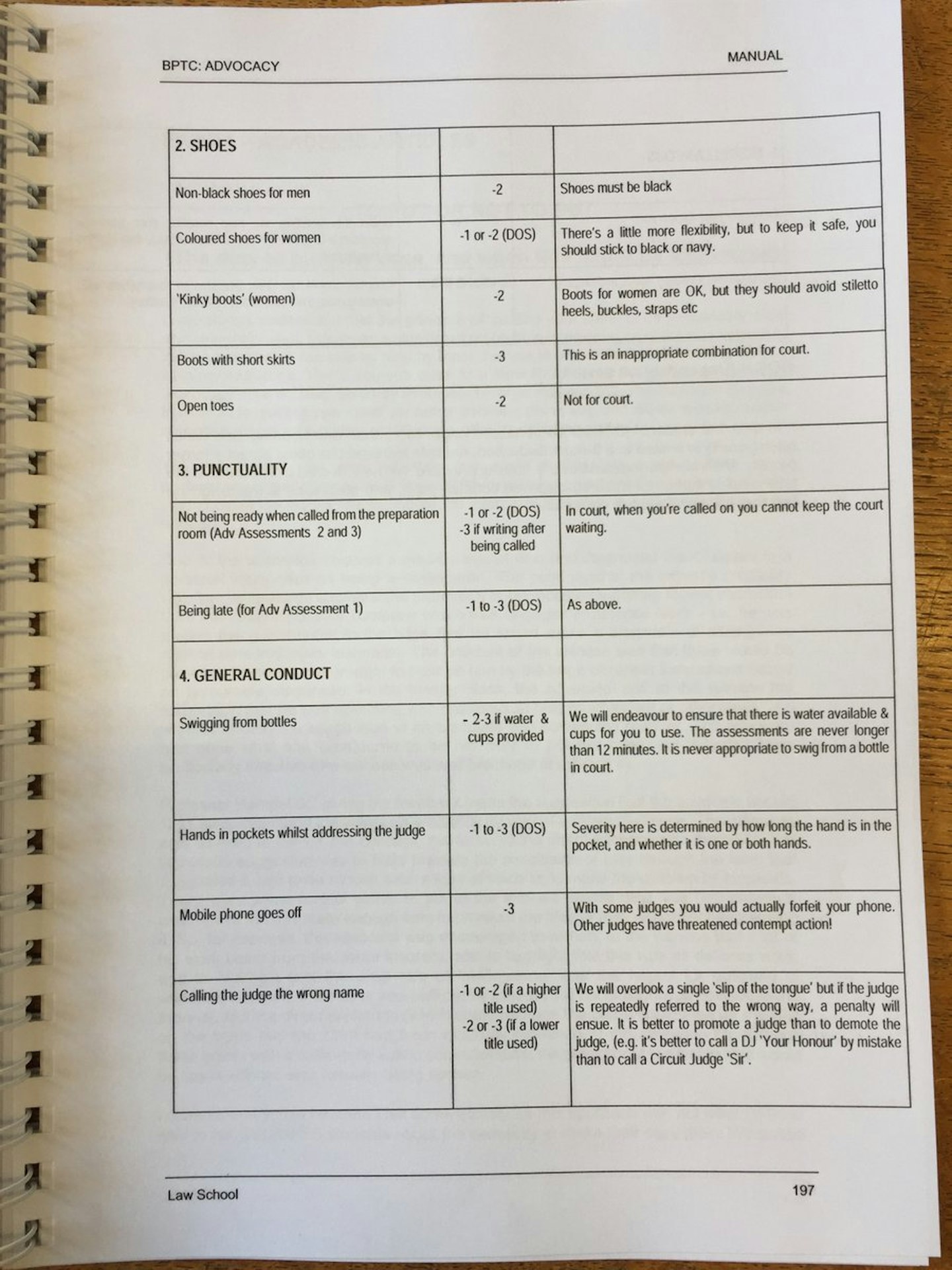Law is a notoriously sexist field. Women make up almost half of lawyers in UK law firms, but only 33% of partner positions. England and wales have one of the lowest proportions of female judges across Europe. Two thirds of female lawyers experience sexual harassment at work, while 50% of men at firms think it’s only a ‘minor problem’. The statistics go on. And it’s not just at work that problematic attitudes begin, evidently it begins right when you start to study the profession.
BPP University Law School, based in Holborn, has proven this with pages of their professional conduct handbook for advocacy assessments leaked to Legal Cheek. The document advises in great depth how many points will be lost for various offences, which include women losing two points for wearing a skirt that shows anything above the knee, losing three points if their bra is visible and another two for wearing ‘kinky boots’.
Yes, the people teaching future barristers about all aspects of law including sexual misconduct essentially uphold the idea that clothes can be inherently ‘kinky’ and covering your body means you’re more valuable- literally, since they’re using points. Because we all know that short skirts mean your incapable of doing your job, I also heard long sleeves mean you forget how to open doors, honestly- the link between clothing and professional capabilities is endless.

The highly problematic list also includes ridiculous, albeit less offensive and less penalized on the point system, expectations for men, including them wear ‘DOUBLE BREASTED or 3-PIECE’ jackets (their capitals, not mine), because again, no one can POSSIBLY understand law in a single-breasted jacket. On a serious note, it’s upholding ridiculous standards such as this that prevent lower income students from entering the legal profession, perpetuating the elitist attitude within law and underrepresentation of anyone who’s not a Harvey Specter-in-waiting.
For the female trainee barristers, this subtle classism puts them in a double bind, where yet again their clothing is policed in an inherently sexist way, putting them up against both sexism and classism before they even qualify and enter the notoriously problematic profession.
The response from BPP is honestly laughable, they told the Daily Telegraph:
‘Our students dress conservatively and smartly for their advocacy classes and indeed for the assessment, and this is good preparation for practice.
‘It is exceptionally rare that any student is ever penalised in an assessment for any of the infringements listed. The list has not been revised for a long time and will be reconsidered before the next publication.’
Essentially passing the buck onto expectations of dress in court, as if that somehow excuses them, their reluctant ‘we’ll review it’ attitude is reminiscent of all the times businesses are called out for making women wear heels to work. In 2016, Nicola Thorp made the news when she was sent home for refusing to wear high heels during her shift at finance company PwC, who felt the need to make the point she had ‘signed the appearance guidelines’ before unenthusiastically offering to review them.
Whether or not the guidelines will actually change remains to be seen, although hopefully the scandal around the rules will enable trainee barristers who are penalized for their dress to appeal the mark.
Let’s just say it one more time, for the old male lawyers in the back, the clothing that you wear, and how much of it your wearing, has absolutely NO impact on your ability to do a job, and should not impede how much respect you’re given. The idea that dressing ‘conservatively’ means you’re more deserving of points and more able to do your job is absolutely ludicrous.
Our clothes do not speak for our personalities, academic qualifications or professional capabilities, just as they don’t speak for our sexual prowess.
Click through to see more facts about women around the world...
Debrief Facts about women around the world
 1 of 18
1 of 18Facts about women around the world
 2 of 18
2 of 18Facts about women around the world
 3 of 18
3 of 18Facts about women around the world
 4 of 18
4 of 18Facts about women around the world
 5 of 18
5 of 18Facts about women around the world
 6 of 18
6 of 18Facts about women around the world
 7 of 18
7 of 18Facts about women around the world
 8 of 18
8 of 18Facts about women around the world
 9 of 18
9 of 18Facts about women around the world
 10 of 18
10 of 18Facts about women around the world
 11 of 18
11 of 18Facts about women around the world
 12 of 18
12 of 18Facts about women around the world
 13 of 18
13 of 18Facts about women around the world
 14 of 18
14 of 18Facts about women around the world
 15 of 18
15 of 18Facts about women around the world
 16 of 18
16 of 18Facts about women around the world
 17 of 18
17 of 18Facts about women around the world
 18 of 18
18 of 18Facts about women around the world
This article originally appeared on The Debrief.
